最新英语作文-医患关系
医患关系英语作文

医患关系英语作文英文回答:As a doctor, building a good doctor-patientrelationship is crucial in providing effective medical care.I believe that communication is the key to establishing a positive and trusting relationship with my patients. When I first meet a patient, I always make sure to introducemyself and address them by their preferred name. Thissimple gesture helps to create a sense of mutual respectand sets the tone for a respectful and collaborative relationship.I also make an effort to listen actively to mypatients' concerns and questions. I encourage them to share their thoughts and feelings about their health, and I take the time to carefully address each of their concerns. By doing so, I show my patients that I value their input and that I am committed to providing them with personalized care.In addition to effective communication, I believe that empathy is essential in the doctor-patient relationship. I always strive to put myself in my patients' shoes and understand their experiences and emotions. For example, if a patient is feeling anxious about a medical procedure, I acknowledge their feelings and offer reassurance and support. This helps to build trust and comfort, and it shows my patients that I genuinely care about their well-being.Furthermore, I make it a point to be transparent with my patients. I explain their diagnosis and treatment plan in a clear and understandable manner, and I encourage them to ask questions if they have any doubts or uncertainties. By being open and honest, I empower my patients to take an active role in their own healthcare and make informed decisions about their treatment.Overall, I believe that a strong doctor-patient relationship is built on communication, empathy, and trust. By prioritizing these elements in my interactions withpatients, I can provide them with the best possible care and support.中文回答:作为一名医生,建立良好的医患关系对于提供有效的医疗护理至关重要。
医学博士英语作文summary医患关系

医学博士英语作文summary医患关系English:The doctor-patient relationship is a crucial aspect of healthcare, with effective communication and trust being key components. Good communication between doctors and patients is essential for successful diagnosis, treatment, and overall patient satisfaction. Patients rely on doctors to provide them with accurate information, listen to their concerns, and involve them in the decision-making process regarding their health. Trust plays a significant role in the doctor-patient relationship, as patients need to have confidence in their doctor's skills, knowledge, and judgment. Building trust often requires doctors to demonstrate empathy, compassion, and respect towards their patients. In return, patients must also be honest, open, and cooperative in their interactions with their healthcare providers. Ultimately, a strong doctor-patient relationship leads to better health outcomes, increased patient compliance, and improved overall healthcare experiences for both parties.中文翻译:医患关系是医疗保健中至关重要的一个方面,有效的沟通和信任是关键组成部分。
谈论医患关系英语作文范文
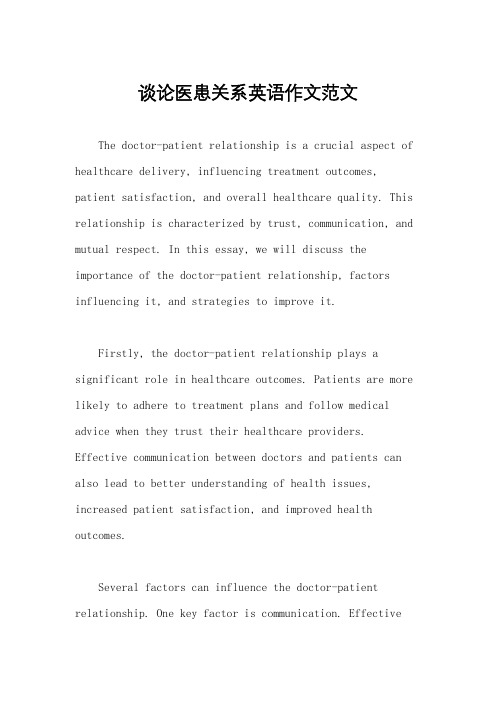
谈论医患关系英语作文范文The doctor-patient relationship is a crucial aspect of healthcare delivery, influencing treatment outcomes, patient satisfaction, and overall healthcare quality. This relationship is characterized by trust, communication, and mutual respect. In this essay, we will discuss the importance of the doctor-patient relationship, factors influencing it, and strategies to improve it.Firstly, the doctor-patient relationship plays a significant role in healthcare outcomes. Patients are more likely to adhere to treatment plans and follow medical advice when they trust their healthcare providers. Effective communication between doctors and patients can also lead to better understanding of health issues, increased patient satisfaction, and improved health outcomes.Several factors can influence the doctor-patient relationship. One key factor is communication. Effectivecommunication involves listening to patients' concerns, providing clear explanations, and involving patients in decision-making. Another factor is empathy. Empathetic doctors are better able to understand their patients' emotions and perspectives, which can help build trust and rapport. Additionally, factors such as cultural differences, language barriers, and patient expectations can also impact the doctor-patient relationship.To improve the doctor-patient relationship, healthcare providers can take several steps. Firstly, they can improve their communication skills by actively listening to patients, using plain language, and checking for understanding. Secondly, they can show empathy and understanding towards patients' feelings and concerns. Thirdly, they can involve patients in decision-making by explaining treatment options and encouraging questions. Finally, healthcare providers can also consider cultural factors and patient preferences when delivering care.In conclusion, the doctor-patient relationship is a crucial aspect of healthcare delivery, influencingtreatment outcomes, patient satisfaction, and overall healthcare quality. By focusing on effective communication, empathy, and patient-centered care, healthcare providers can improve the doctor-patient relationship and enhance the quality of care they provide.。
英文作文 医患关系

英文作文医患关系英文:As a doctor, I believe that the doctor-patient relationship is crucial in providing effective healthcare. Building trust and communication between doctors and patients is essential for successful treatment and recovery. 。
First and foremost, it is important for doctors to listen to their patients and understand their concerns. I remember a patient who came to me with chronic back pain. Instead of dismissing his pain as something minor, I took the time to listen to his symptoms and concerns. Through our conversation, I discovered that he had been experiencing the pain for several months and it was affecting his daily life. By taking the time to listen and understand his situation, I was able to provide him with a treatment plan that addressed his specific needs.In addition to listening, it is also important for doctors to communicate effectively with their patients. This includes explaining medical conditions and treatment options in a way that is easily understood. I once had a patient who was diagnosed with diabetes and was feeling overwhelmed by the lifestyle changes that were necessaryfor managing the condition. I took the time to sit down with her and explain the importance of diet and exercise in managing diabetes. I also provided her with resources and support to help her make the necessary changes. By communicating clearly and offering support, I was able to help her feel more confident in managing her condition.On the other hand, patients also play a crucial role in the doctor-patient relationship. It is important for patients to be open and honest with their doctors about their symptoms and concerns. I have had patients who were hesitant to share certain symptoms because they felt embarrassed or ashamed. However, by creating a non-judgmental and supportive environment, I was able to encourage them to open up and discuss their concerns. This allowed me to provide them with the appropriate care andtreatment.In conclusion, the doctor-patient relationship is a partnership that requires trust, communication, and understanding from both parties. By listening, communicating, and being open and honest, doctors and patients can work together to achieve the best possible outcomes.中文:作为一名医生,我相信医患关系对于提供有效的医疗保健至关重要。
医患关系英语作文模板

医患关系英语作文模板英文回答:The doctor-patient relationship is a crucial aspect of the healthcare system. It is important for both doctors and patients to have a good understanding and respect for each other in order to ensure the best possible care. 。
In my own experience, I have had both positive and negative interactions with healthcare professionals. For example, I once had a doctor who took the time to sit down and really listen to my concerns. This made me feel valued and cared for, and I was more willing to follow their treatment plan as a result. On the other hand, I have also had experiences where doctors seemed rushed and dismissive, which made me feel unheard and frustrated.It is clear that communication and empathy play a huge role in the doctor-patient relationship. When doctors take the time to explain things in a way that is easy tounderstand, it can make a world of difference. Similarly, when patients feel that their concerns are being taken seriously, they are more likely to trust and comply withthe recommended treatment.Overall, I believe that a strong doctor-patient relationship is essential for providing effective healthcare. When both parties are able to communicateopenly and respectfully, it creates a foundation of trust and understanding that can lead to better outcomes for everyone involved.中文回答:医患关系是医疗系统中至关重要的一环。
医患关系英文作文模板
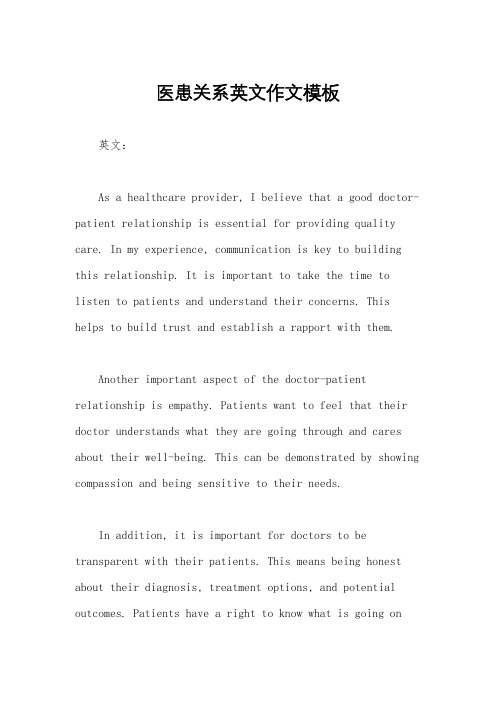
医患关系英文作文模板英文:As a healthcare provider, I believe that a good doctor-patient relationship is essential for providing quality care. In my experience, communication is key to building this relationship. It is important to take the time to listen to patients and understand their concerns. This helps to build trust and establish a rapport with them.Another important aspect of the doctor-patient relationship is empathy. Patients want to feel that their doctor understands what they are going through and cares about their well-being. This can be demonstrated by showing compassion and being sensitive to their needs.In addition, it is important for doctors to be transparent with their patients. This means being honest about their diagnosis, treatment options, and potential outcomes. Patients have a right to know what is going onwith their health and to be involved in the decision-making process.Finally, I believe that a good doctor-patient relationship is a two-way street. Patients should also be respectful and cooperative with their healthcare providers. This includes following treatment plans, keeping appointments, and communicating any concerns or changes in their health status.中文:作为一名医疗保健提供者,我认为良好的医患关系对于提供优质护理至关重要。
英语作文医患关系万能模板
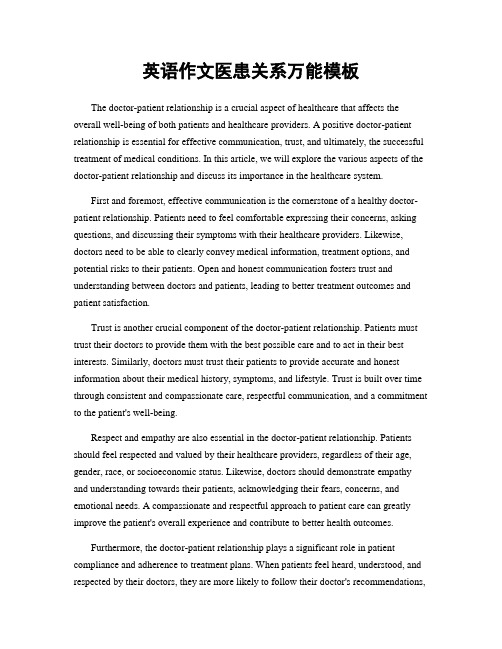
英语作文医患关系万能模板The doctor-patient relationship is a crucial aspect of healthcare that affects the overall well-being of both patients and healthcare providers. A positive doctor-patient relationship is essential for effective communication, trust, and ultimately, the successful treatment of medical conditions. In this article, we will explore the various aspects of the doctor-patient relationship and discuss its importance in the healthcare system.First and foremost, effective communication is the cornerstone of a healthy doctor-patient relationship. Patients need to feel comfortable expressing their concerns, asking questions, and discussing their symptoms with their healthcare providers. Likewise, doctors need to be able to clearly convey medical information, treatment options, and potential risks to their patients. Open and honest communication fosters trust and understanding between doctors and patients, leading to better treatment outcomes and patient satisfaction.Trust is another crucial component of the doctor-patient relationship. Patients must trust their doctors to provide them with the best possible care and to act in their best interests. Similarly, doctors must trust their patients to provide accurate and honest information about their medical history, symptoms, and lifestyle. Trust is built over time through consistent and compassionate care, respectful communication, and a commitment to the patient's well-being.Respect and empathy are also essential in the doctor-patient relationship. Patients should feel respected and valued by their healthcare providers, regardless of their age, gender, race, or socioeconomic status. Likewise, doctors should demonstrate empathy and understanding towards their patients, acknowledging their fears, concerns, and emotional needs. A compassionate and respectful approach to patient care can greatly improve the patient's overall experience and contribute to better health outcomes.Furthermore, the doctor-patient relationship plays a significant role in patient compliance and adherence to treatment plans. When patients feel heard, understood, and respected by their doctors, they are more likely to follow their doctor's recommendations,take their medications as prescribed, and make necessary lifestyle changes. On the other hand, doctors who establish a positive rapport with their patients are better able to understand their patients' needs and concerns, leading to more personalized and effective treatment plans.In addition, a strong doctor-patient relationship can also contribute to the prevention and early detection of medical conditions. Patients who trust and feel comfortable with their doctors are more likely to seek medical advice and undergo regular screenings and check-ups. Likewise, doctors who have a good relationship with their patients are better able to identify potential health risks, provide timely interventions, and encourage healthy behaviors.Finally, the doctor-patient relationship is essential for the overall satisfaction of both patients and healthcare providers. Patients who feel valued, respected, and supported by their doctors are more likely to have a positive healthcare experience and are more likely to recommend their doctors to others. Similarly, doctors who have a strong connection with their patients are more likely to experience job satisfaction and fulfillment in their work.In conclusion, the doctor-patient relationship is a critical component of effective healthcare delivery. By fostering open communication, trust, respect, and empathy, doctors and patients can work together to achieve better health outcomes and improve the overall quality of care. It is essential for healthcare providers to prioritize the development and maintenance of strong doctor-patient relationships in order to provide the best possible care for their patients.。
如何处理医患关系兴英语作文
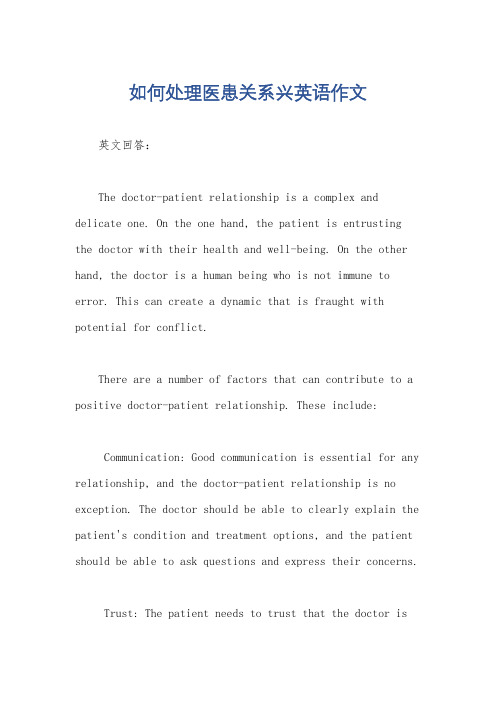
如何处理医患关系兴英语作文英文回答:The doctor-patient relationship is a complex and delicate one. On the one hand, the patient is entrusting the doctor with their health and well-being. On the other hand, the doctor is a human being who is not immune to error. This can create a dynamic that is fraught with potential for conflict.There are a number of factors that can contribute to a positive doctor-patient relationship. These include:Communication: Good communication is essential for any relationship, and the doctor-patient relationship is no exception. The doctor should be able to clearly explain the patient's condition and treatment options, and the patient should be able to ask questions and express their concerns.Trust: The patient needs to trust that the doctor isacting in their best interests. This trust is built over time, as the patient sees that the doctor is competent, compassionate, and honest.Respect: Both the doctor and the patient should respect each other's opinions and feelings. The doctor should not talk down to the patient, and the patient should not be dismissive of the doctor's advice.When the doctor-patient relationship is strong, it can benefit both parties. The patient is more likely to follow the doctor's advice, and the doctor is more likely to understand the patient's needs. This can lead to improved health outcomes and a more satisfying experience for both the patient and the doctor.However, there are a number of things that can damage the doctor-patient relationship. These include:Poor communication: If the doctor is not able to clearly explain the patient's condition and treatment options, or if the patient is not able to ask questions andexpress their concerns, this can lead to misunderstandings and mistrust.Lack of trust: If the patient does not trust that the doctor is acting in their best interests, this can make it difficult for the patient to follow the doctor's advice.Disrespect: If either the doctor or the patient does not respect the other person's opinions and feelings, this can lead to conflict and resentment.If the doctor-patient relationship is damaged, it can have a negative impact on both parties. The patient may be less likely to follow the doctor's advice, and the doctor may be less likely to understand the patient's needs. This can lead to worse health outcomes and a less satisfying experience for both the patient and the doctor.中文回答:医患关系是一种复杂而微妙的关系。
医患关系 英文作文

医患关系英文作文The doctor-patient relationship is a unique and important bond in healthcare. It is a relationship built on trust and mutual respect. Patients rely on doctors to provide them with the best possible care and guidance, while doctors depend on patients to be open and honest about their symptoms and medical history.In the doctor-patient relationship, communication is key. Doctors need to listen attentively to their patients and ask the right questions to fully understand their concerns. Patients, on the other hand, need to feel comfortable enough to share their symptoms and concerns openly. Good communication ensures that both parties are on the same page and can work together to find the best treatment plan.Trust is another crucial aspect of the doctor-patient relationship. Patients trust doctors to make accurate diagnoses and provide effective treatments. Doctors, on theother hand, trust patients to follow their advice and treatment plans. Trust is built over time through consistent and reliable care. When patients trust their doctors, they are more likely to adhere to treatment plans and achieve better health outcomes.Respect is also a fundamental aspect of the doctor-patient relationship. Doctors should respect theirpatients' autonomy and involve them in the decision-making process. Patients have the right to make informed choices about their healthcare and doctors should respect their decisions, even if they may disagree. Likewise, patients should respect their doctors' expertise and follow their recommendations.Empathy plays a significant role in the doctor-patient relationship. Doctors need to understand their patients' emotions and experiences to provide compassionate care. Patients appreciate doctors who show empathy and take the time to address their concerns and fears. Empathy helps create a supportive and understanding environment, which is essential for effective healthcare.In conclusion, the doctor-patient relationship is built on trust, communication, respect, and empathy. It is a unique bond that requires active participation from both parties. By fostering a strong doctor-patient relationship, healthcare outcomes can be improved, and patients can feel more confident and supported in their healthcare journey.。
如何处理医患关系英语作文

如何处理医患关系英语作文英文回答:As a doctor, I believe that building a strong doctor-patient relationship is crucial in providing the best possible care for patients. There are several ways to handle the doctor-patient relationship effectively.Firstly, it is important to establish trust and rapport with patients. This can be achieved by actively listening to their concerns, showing empathy, and involving them in the decision-making process regarding their treatment. For example, I always take the time to sit down with my patients, ask about their day, and listen to their worries and fears. This helps to create a sense of trust and understanding between us.Secondly, effective communication is key in maintaining a healthy doctor-patient relationship. It is important to explain medical conditions and treatment options in a clearand understandable manner. Using simple language and avoiding medical jargon can help patients feel more at ease and empowered in their own healthcare. For instance, I always make sure to explain any medical terminologies in a way that my patients can understand, and I encourage themto ask questions if they are unsure about anything.Furthermore, it is important to show respect and compassion towards patients. This can be demonstrated through simple gestures such as addressing patients bytheir preferred name, maintaining their privacy, and being mindful of their cultural and personal beliefs. For example, I always make an effort to address my patients by their preferred name and ensure that their privacy is respected during examinations and discussions.In addition, it is essential to be honest and transparent with patients. This includes admitting mistakes, discussing potential risks and uncertainties, and providing realistic expectations about their prognosis. Being openand honest fosters a sense of trust and understanding between doctors and patients. For instance, if a mistake ismade in a patient's treatment, I always take responsibility and explain the situation to the patient, and together we work on finding a solution.Finally, it is important for doctors to show empathy and understanding towards their patients' emotions and concerns. This can be achieved by acknowledging their fears and anxieties, offering emotional support, and being present during difficult times. For example, I always make sure to check in on my patients regularly, especially those who are going through a tough time, and offer a listening ear and words of encouragement.In conclusion, handling the doctor-patient relationship effectively involves building trust and rapport, effective communication, showing respect and compassion, being honest and transparent, and showing empathy and understanding. By following these principles, doctors can ensure that their patients feel valued, respected, and well-cared for.中文回答:作为一名医生,我认为建立良好的医患关系对于为患者提供最佳护理至关重要。
医患关系英语作文

医患关系英语作文英文回答:The doctor-patient relationship is a crucial aspect of healthcare, and it plays a significant role in the overall well-being of patients. As a healthcare professional, I believe that building a strong and trusting relationshipwith my patients is essential for providing the best possible care. When patients feel comfortable and supported, they are more likely to communicate openly about their symptoms and concerns, which in turn helps me make an accurate diagnosis and develop an effective treatment plan.One example of the importance of a positive doctor-patient relationship is a case I encountered with a middle-aged woman who had been experiencing chronic pain for several months. When she first came to see me, she was hesitant to share the full extent of her symptoms and was clearly anxious about her condition. However, through open and empathetic communication, I was able to gain her trustand reassure her that I was there to help. As a result, she began to open up about her pain, and together we were able to explore various treatment options and ultimately improve her quality of life.In addition to improving patient outcomes, a strong doctor-patient relationship also contributes to a more positive work environment for healthcare providers. When patients feel valued and respected, they are more likely to adhere to treatment plans and follow medical advice, leading to better health outcomes and reduced healthcare costs. Furthermore, a positive relationship with patients can also lead to greater job satisfaction for healthcare professionals, as it fosters a sense of fulfillment and purpose in their work.中文回答:医患关系是医疗保健中至关重要的一环,对患者的整体健康状况起着重要作用。
六级英语作文医患关系
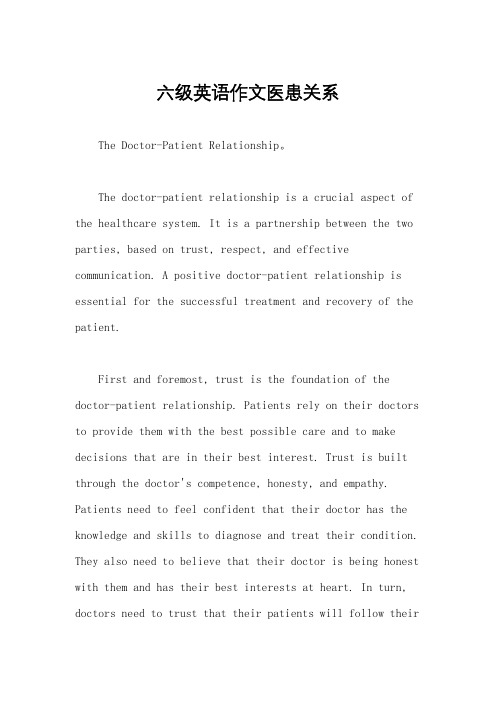
六级英语作文医患关系The Doctor-Patient Relationship。
The doctor-patient relationship is a crucial aspect of the healthcare system. It is a partnership between the two parties, based on trust, respect, and effective communication. A positive doctor-patient relationship is essential for the successful treatment and recovery of the patient.First and foremost, trust is the foundation of the doctor-patient relationship. Patients rely on their doctors to provide them with the best possible care and to make decisions that are in their best interest. Trust is built through the doctor's competence, honesty, and empathy. Patients need to feel confident that their doctor has the knowledge and skills to diagnose and treat their condition. They also need to believe that their doctor is being honest with them and has their best interests at heart. In turn, doctors need to trust that their patients will follow theiradvice and treatment plans.Respect is another key component of the doctor-patient relationship. Patients need to feel that their doctor respects their autonomy and values their input. Doctors should involve patients in the decision-making process and take their preferences and concerns into account. Patients also need to show respect for their doctors by following their instructions and being honest about their symptoms and medical history.Effective communication is essential for building a strong doctor-patient relationship. Doctors need to be able to explain medical concepts and treatment options in a way that is easy for patients to understand. They should also listen to their patients' concerns and address any questions or fears they may have. Patients, in turn, need to be open and honest with their doctors about their symptoms, lifestyle, and any concerns they may have.A positive doctor-patient relationship has numerous benefits for both parties. For patients, it can lead tobetter health outcomes, increased satisfaction with their care, and improved adherence to treatment plans. For doctors, it can result in greater job satisfaction, increased patient compliance, and better treatment outcomes.Unfortunately, the doctor-patient relationship is not always as positive as it should be. Factors such as time constraints, communication barriers, and a lack of trustcan all contribute to a strained relationship between doctors and patients. In some cases, this can lead to misunderstandings, dissatisfaction, and even medical errors.To improve the doctor-patient relationship, bothdoctors and patients need to take an active role. Doctors should make an effort to build trust and rapport with their patients, communicate effectively, and involve patients in their care. Patients, on the other hand, should beproactive in their healthcare, ask questions, and communicate openly with their doctors.In conclusion, the doctor-patient relationship is avital aspect of the healthcare system. It is built on trust,respect, and effective communication, and is essential for the successful treatment and recovery of patients. By fostering a positive doctor-patient relationship, both doctors and patients can work together to achieve the best possible health outcomes.。
医患关系 英文作文

医患关系英文作文英文:Doctor-patient relationship is a very important part of medical care. As a doctor, I believe that building a good relationship with patients is crucial for effective treatment. This involves listening to their concerns, showing empathy, and being honest and transparent about their condition and treatment options.One way to improve doctor-patient relationship is through effective communication. This means taking the time to explain medical jargon and procedures in a way that patients can understand. It also means actively listening to their questions and concerns, and addressing them in a way that is respectful and compassionate.Another important aspect of doctor-patient relationship is trust. Patients need to trust that their doctor hastheir best interests at heart, and that they are receivingthe best possible care. This trust can be built through open and honest communication, as well as through adoctor's actions and behavior.Ultimately, a positive doctor-patient relationship can lead to better health outcomes for patients. When patients feel heard, understood, and cared for, they are more likely to follow through with their treatment plan and make positive changes to their lifestyle.中文:医患关系是医疗护理的一个非常重要的部分。
医患关系英语作文

医患关系英语作文英文回答:Doctor-Patient Relationship: A Delicate Balance。
The doctor-patient relationship is a unique and complex one, characterized by a profound trust and mutual respect.It is a relationship built upon open communication, empathy, and a shared goal of enhancing the patient's well-being.At the heart of this relationship lies the doctor'sduty to provide competent medical care and the patient's right to autonomy and informed decision-making. Doctorsmust possess a comprehensive understanding of medical science, technical skills, and ethical principles. Theymust also be able to communicate effectively with patients, addressing their concerns and explaining treatment optionsin a clear and understandable manner.Patients, in turn, have the right to be informed abouttheir health conditions, treatment options, and potential risks and benefits. They should be involved in decisions regarding their own care, and their preferences and values should be respected. The patient-doctor relationship is not simply a matter of providing medical services; it is also about building a rapport, establishing trust, and fostering a supportive and collaborative environment.However, this delicate balance can be challenged by a variety of factors, including miscommunication, unrealistic expectations, disparities in power, and the influence of technology. It is essential that both doctors and patients work together to navigate these challenges and maintain a healthy and productive relationship.中文回答:医患关系,微妙的平衡。
医患关系英文短作文

医患关系英文短作文英文:Doctor-patient relationship is crucial in healthcare. As a healthcare provider, I believe that building a good relationship with my patients is essential in providing them with the best possible care. Trust, respect, and communication are the key elements in establishing a positive doctor-patient relationship.In order to build trust with my patients, I make sure to listen to their concerns and provide them with honest and accurate information. I also make sure to respect their decisions and involve them in the decision-making process. Communication is also very important in building a good relationship with my patients. I always explain the treatment plan and answer their questions in a clear and understandable manner.However, sometimes it can be difficult to maintain apositive doctor-patient relationship, especially when there are disagreements or misunderstandings. In these situations, it's important to remain calm and professional, and to tryto find a solution that works for both parties.Overall, a positive doctor-patient relationship is essential in healthcare, and I strive to build and maintain good relationships with all of my patients.中文:医患关系在医疗保健中至关重要。
医患关系英语作文模板

医患关系英语作文模板Title: The Doctor-Patient Relationship。
As healthcare professionals, doctors play a crucialrole in the lives of their patients. A strong doctor-patient relationship is essential for effective healthcare delivery. In this article, we will discuss the importance of the doctor-patient relationship, factors that affect it, and ways to improve it.Importance of the Doctor-Patient Relationship。
The doctor-patient relationship is the foundation of healthcare. It is a partnership between the patient and the doctor that is built on trust, respect, and mutual understanding. A strong doctor-patient relationship has been shown to improve patient outcomes, increase patient satisfaction, and reduce healthcare costs.When patients trust and respect their doctors, they aremore likely to follow their treatment plans and take their medications as prescribed. This leads to better health outcomes and reduces the likelihood of hospital readmissions. Patients who are satisfied with their doctors are also more likely to recommend them to others, which can increase the doctor's patient base.Factors that Affect the Doctor-Patient Relationship。
处理医患关系 英语作文
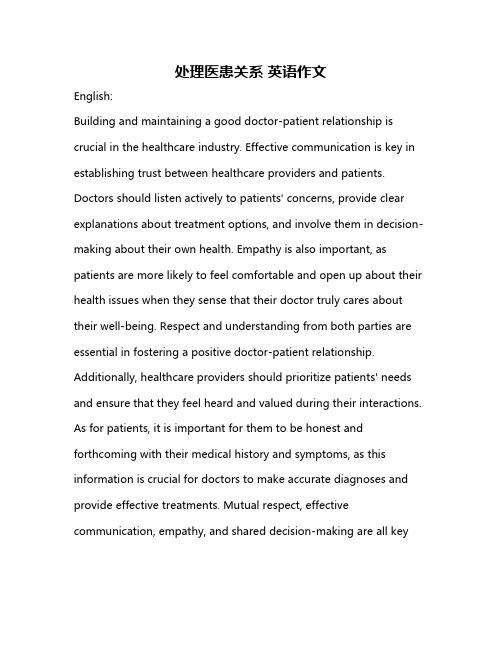
处理医患关系英语作文English:Building and maintaining a good doctor-patient relationship is crucial in the healthcare industry. Effective communication is key in establishing trust between healthcare providers and patients. Doctors should listen actively to patients' concerns, provide clear explanations about treatment options, and involve them in decision-making about their own health. Empathy is also important, as patients are more likely to feel comfortable and open up about their health issues when they sense that their doctor truly cares about their well-being. Respect and understanding from both parties are essential in fostering a positive doctor-patient relationship. Additionally, healthcare providers should prioritize patients' needs and ensure that they feel heard and valued during their interactions. As for patients, it is important for them to be honest and forthcoming with their medical history and symptoms, as this information is crucial for doctors to make accurate diagnoses and provide effective treatments. Mutual respect, effective communication, empathy, and shared decision-making are all keyfactors in building and maintaining a strong doctor-patient relationship.中文翻译:建立和维护良好的医患关系在医疗行业至关重要。
英语作文模板医患关系
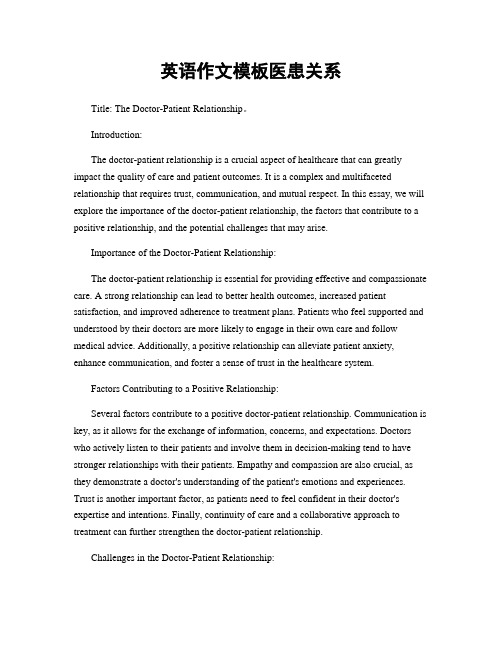
英语作文模板医患关系Title: The Doctor-Patient Relationship。
Introduction:The doctor-patient relationship is a crucial aspect of healthcare that can greatly impact the quality of care and patient outcomes. It is a complex and multifaceted relationship that requires trust, communication, and mutual respect. In this essay, we will explore the importance of the doctor-patient relationship, the factors that contribute to a positive relationship, and the potential challenges that may arise.Importance of the Doctor-Patient Relationship:The doctor-patient relationship is essential for providing effective and compassionate care. A strong relationship can lead to better health outcomes, increased patient satisfaction, and improved adherence to treatment plans. Patients who feel supported and understood by their doctors are more likely to engage in their own care and follow medical advice. Additionally, a positive relationship can alleviate patient anxiety, enhance communication, and foster a sense of trust in the healthcare system.Factors Contributing to a Positive Relationship:Several factors contribute to a positive doctor-patient relationship. Communication is key, as it allows for the exchange of information, concerns, and expectations. Doctors who actively listen to their patients and involve them in decision-making tend to have stronger relationships with their patients. Empathy and compassion are also crucial, as they demonstrate a doctor's understanding of the patient's emotions and experiences. Trust is another important factor, as patients need to feel confident in their doctor's expertise and intentions. Finally, continuity of care and a collaborative approach to treatment can further strengthen the doctor-patient relationship.Challenges in the Doctor-Patient Relationship:Despite the importance of the doctor-patient relationship, there are several challenges that can hinder its development. Time constraints in healthcare settings may limit the opportunity for meaningful interactions between doctors and patients. Language and cultural barriers can also impede effective communication and understanding. Additionally, power differentials and perceived hierarchies within the healthcare system may create barriers to open and honest dialogue. Furthermore, the increasing use of technology in healthcare may depersonalize the doctor-patient relationship and diminish the human connection.Strategies for Improving the Doctor-Patient Relationship:To address the challenges and strengthen the doctor-patient relationship, various strategies can be implemented. Healthcare organizations can prioritize patient-centered care and provide resources to support effective communication and empathy training for healthcare providers. Encouraging shared decision-making and involving patients in their care can also enhance the relationship. Additionally, promoting continuity of care and fostering a supportive and respectful healthcare environment can contribute to a positive doctor-patient relationship. Embracing cultural competence and utilizing interpretation services can help bridge language and cultural barriers. Furthermore, integrating technology in a way that complements rather than replaces human interaction can preserve the personal touch in healthcare.Conclusion:The doctor-patient relationship is a cornerstone of healthcare that significantly influences patient well-being and satisfaction. By prioritizing effective communication, empathy, and trust, healthcare providers can build strong and meaningful relationships with their patients. Addressing the challenges and implementing strategies to improve the doctor-patient relationship can lead to better health outcomes and a more compassionate healthcare system. As we continue to navigate the complexities of modern healthcare, nurturing and preserving the doctor-patient relationship should remain a fundamental priority.。
医患关系英文作文 博士考试

The Doctor-Patient Relationship: Its Complexities and the Path to HarmonyThe doctor-patient relationship is a cornerstone of healthcare, yet it is often fraught with complexities and challenges. As a budding healthcare professional aspiring to become a doctor, I believe it is crucial to delve into this relationship and explore ways to foster a more harmonious and effective partnership.At the heart of this relationship lies trust. Patients entrust their doctors with their health and well-being, often during vulnerable and uncertain times. This trust is built over time, through open communication, empathy, and consistent delivery of quality care. However, in today's fast-paced healthcare environment, these foundational elements are often overlooked or neglected.One of the primary challenges facing the doctor-patient relationship is the issue of time. With increasing patient loads and administrative demands, doctors often find it difficult to spend adequate time with each patient. This can lead to a lack of understanding and misinterpretation of medical information, resulting in patient dissatisfaction and distrust.Another challenge is the growing gap in healthcare literacy. Many patients lack the necessary knowledge and understanding to make informed decisions about their health. This can lead to confusion, anxiety, and even compliance issues, further straining the doctor-patient relationship.To address these challenges and foster a more harmonious doctor-patient relationship, several strategies can be employed. Firstly, doctors must prioritize communication. By actively listening to patients, clarifying medical information in simple terms, and addressing concerns and questions thoroughly, doctors can establish a foundation of trust and understanding.Secondly, doctors should make an effort to increase patient involvement in their care. By educating patients about their condition, treatment options, and self-care measures, doctors can empower patients to take an active role in their healthcare. This not only improves patient satisfaction but also leads to better health outcomes.Finally, healthcare systems need to be restructured to provide doctors with more time and resources to devote to their patients. This includes reducing administrative burdens, streamlining workflows, and utilizing technology to improve efficiency. By creating a more supportive environment for doctors, they can in turn provide better care for their patients.In conclusion, the doctor-patient relationship is a delicate balance that requires constant attention and nurturing. By prioritizing communication, increasing patient involvement, and restructuring healthcare systems, we can foster a more harmonious and effective partnership that benefits both doctors and patients alike.。
- 1、下载文档前请自行甄别文档内容的完整性,平台不提供额外的编辑、内容补充、找答案等附加服务。
- 2、"仅部分预览"的文档,不可在线预览部分如存在完整性等问题,可反馈申请退款(可完整预览的文档不适用该条件!)。
- 3、如文档侵犯您的权益,请联系客服反馈,我们会尽快为您处理(人工客服工作时间:9:00-18:30)。
医患关系作为社会系统的重要组成部分,在创建互助友爱的卫生环境中起着先导性和基础性的作用。
但当前医患关系却不容乐观,因社会,伦理道德等因素的影响,各种医患矛盾正在成为阻碍构建和谐社会的主要问题之一。
近年来,医患关系的紧张引起了人们的普遍关注。
为了让医学回归“医本仁术”的本性,缓解紧张的医患关系,我有以下几点看法。
As an important component of the social system ,physician—patient relationship plays a guiding and fundamental role in creating a harmonious healthcare environment 。
However ,due to certain social ,ethical and moral factors ,the current physician—patient relationship is not favorable ,and various contradictions in physician—patient relationship are becoming barriers in building up a harmonious society 。
In recent years ,the tense relationship between doctors and patients has caused extensive concern 。
In order to enable medicine return to its“merciful”nature and relieve the tension of relationship between doctors and patients,there’re several points as follows 。
首先,重建医患信任。
信任是建立良好医患关系的基础。
第二,加强医患沟通。
医生与病人的有效沟通与交流是诊疗实践的重要技术,它在对病人病情的认识,治疗和康复中都起着十分重要的作用。
第三,通过建立积极的医院形象包括医疗服务,质量和环境来发展新型的医患关系。
医院必须尽可能提高医务人员技术水平和业务素质,确保医疗安全。
第四,倡导健康的医院文化,促进医德医风建设。
最后一点,弘扬中华民族传统医学人文关怀的优秀思想,开展具有人文精神的“人性化服务”:尊重、关爱、服务病人。
First ,reestablish doctor—patient trust relationship 。
Trust is the basis for constructing a good physician—patient relationship 。
Secondly ,strengthen the communication between doctors and patients 。
Communication between doctors and patients is the important skill for learning sickness ,treatment and rehabilitation 。
Third ,develop new harmonious physician—patient relationship by creating positive hospital image of medical service ,quality and environment 。
Hospitals should try their best to increase the medical skills and occupational qualities of their staffs to assure the safety of medical work.。
Fourth ,initiate healthy hospital culture and promote medical ethics and style 。
Finally,advance and enrich the ideology of Chinese traditional Medical Humanities Concern 。
It should develop humanistic service ,which includes respecting ,caring for and serving the patients 。
化解医患矛盾,构建和谐医患关系,不仅需要医患双方的努力,还需要社会的支持。
同样,社会也应把医患关系的构建作为自身健全发展的一个重要任务。
To relieve physician—patient conflicts and construct a harmonious physician—patient relationship need not only the efforts of both sides but also the support of the society 。
Similarly ,the society should regard the building of physician—patient relationship as a significant task in self—improvement and development 。
